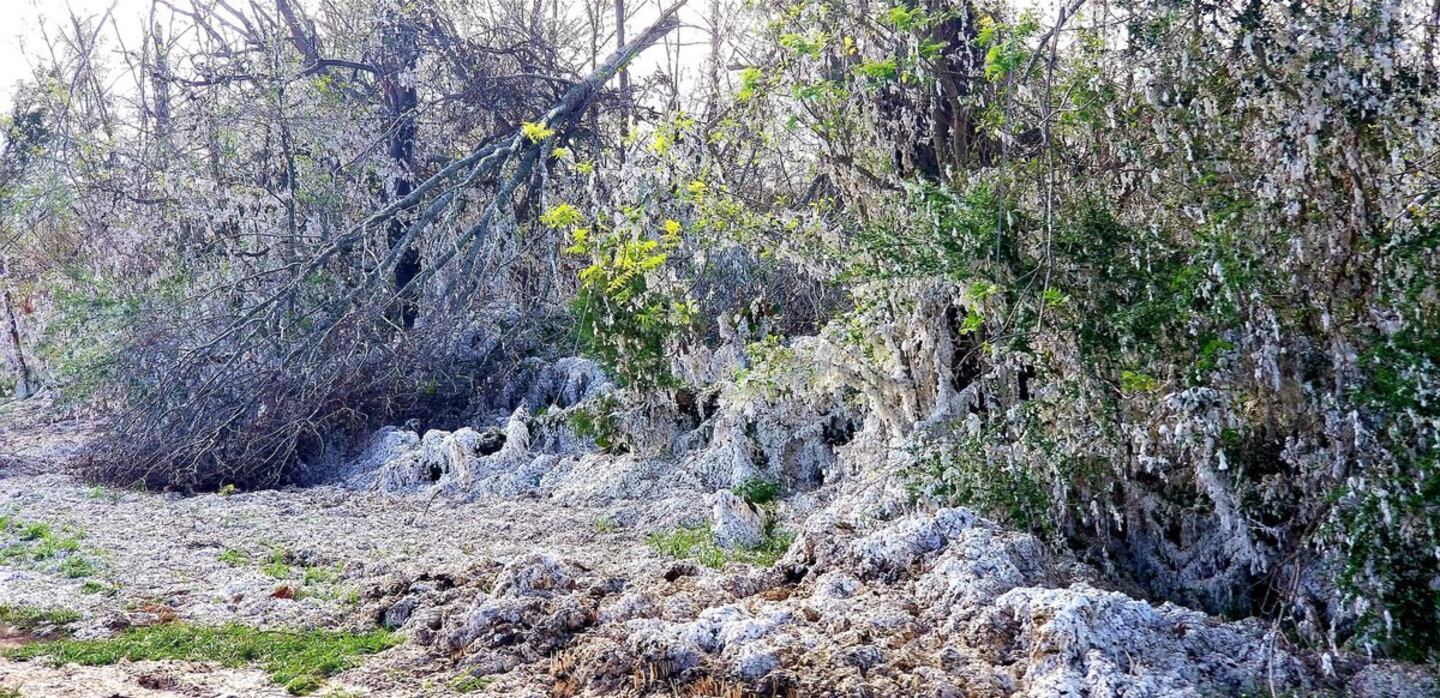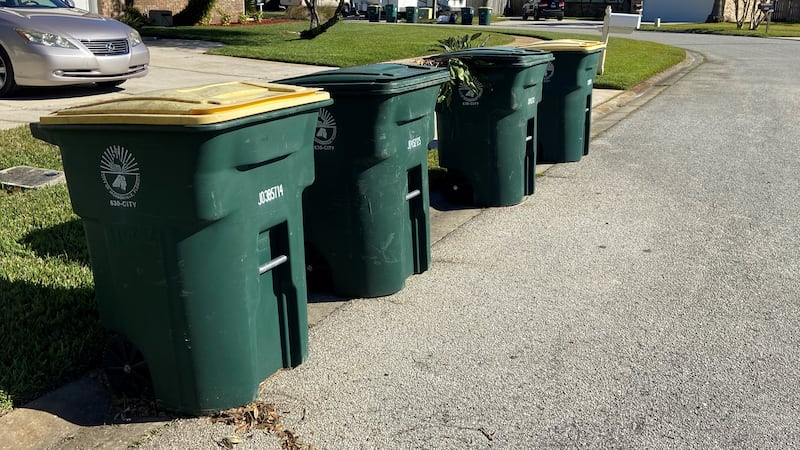Nov. 13, 2018 — Our way above avg. fall temps. have continued into Nov. but will be "arrested" for several days through the weekend leading up to Thanksgiving. 85% of the days from Sept. 1 through Nov. 13 - 63 of 74 days - were above avg.
Speaking of Thanksgiving - the holiday is fast approaching &, in fact, is the earliest it can be on the calendar - the 22nd (will be the latest next year - 28th). A busy travel week, & it does look like I'll be tracking a low latitude storm system moving eastward toward Jacksonville. Early indications are that there will be some wet weather for at least parts of the Thanksgiving weekend. Stay updated by downloading the First Alert Weather app... &/or going to the Action News Jax weather page. For travel conditions by highway - click * here *.... by air - * here *.
The Panhandle continues to long clean-up process post hurricane Michael (see my blog: "Forecasting monster hurricane Michael"). Pete Miller from Jacksonville is helping his brother in Quincy, Fl. clear trees & debris after the storm & has shared the photos below (the first one is cotton striped from nearby fields):
Baby cheetahs - a litter of four "kitties" - have been born at White Oak Conservation, Yulee. If you're not familiar with this large & fascinating local conservation area near the Fl./Ga. border, take a look! - here. From White Oak:
Yulee, Fla. (Nov. 12, 2018) — White Oak Conservation is pleased to announce that four cheetah cubs have been born at White Oak, a wildlife refuge in northeastern Florida owned by philanthropists Mark and Kimbra Walter.
The two female and two male cubs, which have not yet been named, were born last month and are being reared by their mother, Oronsay. The cubs spent the first few weeks of life in their specially built den and recently began exploring outside. They weigh about 300-500 grams each and were born with their distinctive spots.
Cheetahs are a threatened species, with only 7,000 estimated to live in the wild in Africa and Iran. Their numbers have declined drastically as a result of poaching, habitat loss, the illegal pet trade and because of ranchers, who trap and shoot them to protect livestock.
“We are proud these two cubs bring us closer to saving this species from extinction,” Mark Walter said. “Exceptional planning and care are needed to ensure the cheetah’s survival, and days like this make us hopeful for the future.”
Cheetahs first arrived at White Oak in 1985. Since then, 187 cubs in 52 litters have been born at the refuge. The four new cubs are the second litter for Oronsay, who came to White Oak from Busch Gardens. The cubs’ father is Wookie, who was born at White Oak. This is his first litter.
White Oak is dedicated to saving endangered species such as cheetahs and leads global conservation through innovative science, education, training and collaborations.
White Oak hosted a cheetah conference Oct. 22-26, drawing cheetah experts from around the world to share information and strategies on preserving this vulnerable species, which has disappeared from many areas of Africa and Asia where it once thrived.
“Each cheetah born at White Oak is an important addition and contributes to sustaining a global population of these unique cats,” said Steve Shurter, CEO of White Oak Conservation. “This welcome birth event was particularly timely, occurring as White Oak convened international experts to strategize on improving the long-term outlook for cheetahs.”
Fact about cheetahs:
- Cheetahs are the fastest land animals, employing incredible bursts of speed in 60 to 70 mph runs to catch antelope, hares or birds.
- To communicate, cheetahs make a high-pitched chirping sound that sounds almost bird-like.
- Cheetah litter sizes typically range from three to five cubs
- Female cheetahs separate themselves and live solitary lives, while males stay together in groups called coalitions.
About White Oak Conservation
White Oak works to save endangered species and wild places. White Oak leads global conservation through innovative science, education, training, and collaborations. We are committed to providing conservation options for many of the species that need them the most. White Oak’s 17,000 riverfront acres in northeast Florida provide a refuge for more than 17 endangered species. Additionally, White Oak works to help and inspire others to support conservation by hosting education, conservation, corporate and family groups for visits, overnight stays, conferences, and meetings. We are an Association of Zoos & Aquariums (AZA) certified facility. White Oak is owned by philanthropists Mark and Kimbra Walter.
Earth Gauge (NEEF):
The amount of waste Americans generate has been on the rise—from 3.66 pounds per person per day in 1980 to 4.48 pounds per person per day in 2015—but we’re also recycling and composting more. Today we recycle or compost about 34.7% of our waste, up from less than 10% in 1980.
In 2015, Americans recycled and composted 91 million tons of waste. Keeping waste out of landfills and incinerators reduces CO2 emissions; in 2014, the waste recycled and composted offset emissions by 181 million metric tons—the equivalent to the annual emissions of 38 million cars!
November 15 is America Recycles Day. Take this opportunity to scour your home, school, or office for unusual items that you don't need any more but can be recycled:
- hair care and mouthwash bottles;
- plastic bags and plastic wrap used to package paper towels, toilet paper, and dry-cleaning;
- mobile phones, tablets, computers, video game consoles, TVs, and other electronics.
Recycling these items gives them new life. Plastic containers can become new plastic products, carpeting, or car parts. Plastic bags and plastic wrap can become new plastic bags, shopping carts, or fencing and deck materials. Valuable metals from electronics can be used in jewelry, new electronics, and car parts.
Before tossing something in the trash bin, find out if it can be recycled. Visit www.iwanttoberecycled.org to learn more about the lifecycle of recycled products and find a recycling center where you live.
Sources:
- Ad Council and Keep America Beautiful. 2015. “Electronics (E-scrap).” Accessed October 26.
- Ad Council and Keep America Beautiful. 2015. “Plastic Bags and Film.” Accessed October 26.
- Ad Council and Keep America Beautiful. 2015. “Plastic Bottles and Containers.” Accessed October 26.
- Keep America Beautiful. 2015. “Keep America Beautiful Brings Focus to “Bathrooms, Bags & Gadgets” for America Recycles Day 2015.” Accessed October 26.
- US EPA. 2016. “Advancing Sustainable Materials Management: 2014 Fact Sheet.”
- US EPA. 2018. "Advancing Sustainable Materials Management: 2015 Fact Sheet."
Cox Media Group













